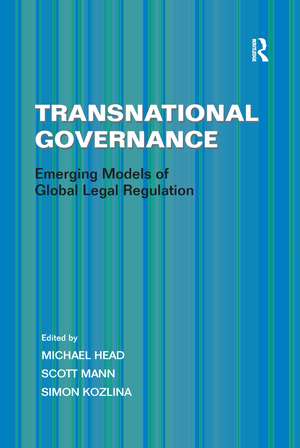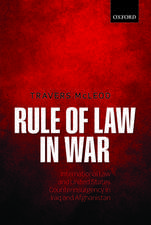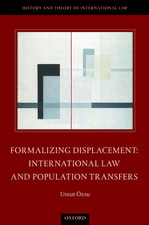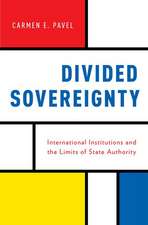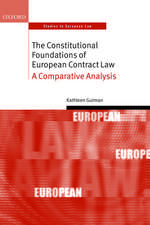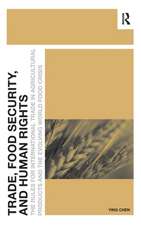Transnational Governance: Emerging Models of Global Legal Regulation
Autor Scott Mann Editat de Michael Headen Limba Engleză Paperback – 9 sep 2016
| Toate formatele și edițiile | Preț | Express |
|---|---|---|
| Paperback (1) | 468.36 lei 6-8 săpt. | |
| Taylor & Francis – 9 sep 2016 | 468.36 lei 6-8 săpt. | |
| Hardback (1) | 1058.86 lei 6-8 săpt. | |
| Taylor & Francis – 28 mai 2012 | 1058.86 lei 6-8 săpt. |
Preț: 468.36 lei
Nou
Puncte Express: 703
Preț estimativ în valută:
89.62€ • 93.82$ • 74.15£
89.62€ • 93.82$ • 74.15£
Carte tipărită la comandă
Livrare economică 05-19 aprilie
Preluare comenzi: 021 569.72.76
Specificații
ISBN-13: 9781138249332
ISBN-10: 1138249335
Pagini: 280
Dimensiuni: 156 x 234 x 15 mm
Greutate: 0.43 kg
Ediția:1
Editura: Taylor & Francis
Colecția Routledge
Locul publicării:Oxford, United Kingdom
ISBN-10: 1138249335
Pagini: 280
Dimensiuni: 156 x 234 x 15 mm
Greutate: 0.43 kg
Ediția:1
Editura: Taylor & Francis
Colecția Routledge
Locul publicării:Oxford, United Kingdom
Cuprins
Contents: Preface; Introduction, Michael Head, Scott Mann and Simon Kozlina; Origins of transnational governance in the 19th century, Simon Chapple; Challenging neoliberal ideology in a global financial crisis, Scott Mann; Trade governance: legal institutionalism as a magnet for non-trade issues. A study of the mixed benefits of WTO dispute settlement for enforcing international obligations, Simon Kozlina; Taxation governance: could the Tobin tax assist in democratising globalisation?, Elfriede Sangkuhl; Corruption, international business transactions and the OECD, John Juriansz and Maria Nehme; Human rights and international environmental governance, Laura Horn; Global governance implications of terrorism: using UN Resolutions to justify abuse of basic rights, Michael Head; International criminal governance: will the International Criminal Court be an 'effective' mechanism for justice?, Steven Freeland; Governing humanitarian intervention: time for change, Michelle Sanson; Index.
Notă biografică
Dr. Scott Mann is Associate Professor of Law, author of several works on legal theory, economics and ethics. Dr. Michael Head is Professor of Law and the author of books on administrative law, ethics and critical thinking. Simon Kozlina is a Lecturer in Law, specialising in international trade law.
Recenzii
'Until the publication of this text it has always been difficult to conceptualize the meaning and scope of Transnational Governance. By incorporating a varied group of contributors who are all experts in their own fields, the editors of this publication have been able to achieve a credible explanation of an increasingly challenging feature of international regulation and governance.' David Barker AM, Emeritus Professor and Editor of the Legal Education Digest ’The University of Western Sydney School of Law has produced an exciting, wide-ranging and versatile survey of the past, present and future systems of transnational governance. Importantly, this book contributes to our understanding of the sources, causes and effects of the increasing legalization of global governance.’ Heikki Patomäki, University of Helsinki, Finland
Descriere
As globalization continues to spread and evolve, so nation-states attempt to govern financialization, tax evasion, corruption, terrorism, civil and military conflicts and environmental dangers, social polarization and the complexities in human rights implementation, by institutional and transnational means. This volume discusses these issues from different legal perspectives and highlights the challenges of governing human activity in an age of remarkable interconnectedness.
